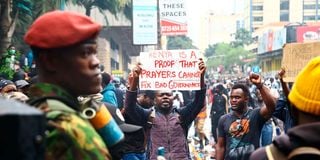
Demonstrators display placards during the Anti-Finance Bill protests in Nairobi on June 20, 2024.
Kenya has just endured another extraordinary week, replete with upheaval, spectacle and the explosive emergence of new and unsettling possibilities which threaten the capacity of our politics to leverage the constitutional dispensation in managing contradictions.
Following the tragic shooting of a magistrate while presiding over court, the Kenya Magistrates and Judges Association (KMJA) gave notice of closure of courts throughout the country to protest threats to the personal security of judicial officers.
In giving notice, the KMJA effectively assumed the essential character of a labour union, initiated industrial action, thereby violating the universal expectation that courts of law are open to all in perpetuity, and contradicting the well-known position that the terms of service of judicial officers are constitutionally inscribed and not subject to industrial bargaining frameworks.
By extension, the Judiciary ipso facto assumed unconstitutional powers to arbitrarily determine whether, where and when justice is available through our courts of law, and used a tragedy to extinguish the legitimate expectations of free access to courts of law to thousands of Kenyans, including many victims of heinous crimes and reprehensible injustice, whose only hope of redress lies before them.
In the end, the Chief Justice gave a directive requiring judicial officers to keep courts open and report to duty without fail. This was all fine, except that she felt a most irrational need to justify her directive by reference to assurances she had received with respect to enhanced security for courts and judicial officers.
In articulating her directive thus, the Chief Justice basically invoked the vocabulary of a return-to-work formula, perpetuating the unsettling parallel with industrial action, and potentially inaugurating a culture of delinquent judicial politics that will fundamentally circumscribe the fundamental right to access to justice.
Not to be outdone, young Kenyans, for long dismissed with casual contempt as politically disengaged ‘softies', arose and shook up our political firmament, sending cataclysmic political shockwaves of an unprecedented magnitude.
Sinister possibilities
Every assumption about younger citizens that has underpinned policy and strategy up to this moment has been dismantled and rendered obsolete for all time.
We are invited to urgently ponder the implications of the sudden and dramatic collapse of a set of assumptions which for long proved robust and strategically dependable.
In political terms, we could be at ground zero of political possibilities. This could be the delayed moment of institutional germination anticipated in the constitution, and the momentous severing of a political umbilical cord which once was indispensable for the Republic to be viable, but is now a menacing noose and durable fetters.
Are protest and public participation finally going to emerge as platforms for brilliant ideas to contend and fortify the national agenda.
Equally possible are more sinister possibilities. A disturbingly salient feature of the ‘Reject' campaign has been strenuous intolerance of differing views complemented with virulent onslaughts, including vicious cyber bullying and other coordinated hate crimes and toxic misconduct.
There is recent precedent of stable democracies being hijacked by weaponised algorithms that poisoned course and generated perverse outcomes. Telling indications are emerging that the ‘Occupy' dimension of the campaign might take a radical trajectory entailing unlawful seizure of sensitive state facilities, under the pretext of the people’s direct exercise of sovereign power.
The beauty of this moment was not just that young citizens are coming of age in an historic pageant of incomparable splendour, it was also that this brave new generation was going to usher us into the constitution's promised land of truly sovereign, free, inclusive, democratic and non-negotiably value-based era where constitutionalism and human rights are sacrosanct.
People's sovereign power
Bearing in mind that the best argument for fascism and other forms of tyranny, is the desirability of configuring large populations into a pliable, regimented mass, making them an effective vehicle of certain agenda, the exigencies of effective coordination must never undermine the commitment to freedom, democracy, transparency and accountability that has imbued the Generation Z movement with righteous appeal.
It is also useful to remember that the same portion of the constitution which affirms the people's sovereign power explicitly proscribes any attempts to acquire authority by means other than those it sets out.
Whilst insurrection may be tempting to those radicalised by the intoxicating momentum of the campaign, it would be the tragic and unwise culmination of a movement born of such wondrous promise.
The third paradox is the police service's complicated struggle to maintain public order in the face of a tumultuous surge of very young, highly animated activists in the context of a history of looting and unmitigated mayhem, juxtaposed by a harrowing catalogue of brutality, violation of rights and freedoms, abuse and misconduct.
For the police, the solution is a crude one: use all means to make protest undesirable and impossible. Protest is not only legitimate; it is a fundamental component of democratic expression.
When despots are not forcing us to choose between democracy and development, they are asking us to choose between democracy and security. These are false binaries we must all be happy to reject without hesitation.
The writer is an Advocate of the High Court of Kenya







